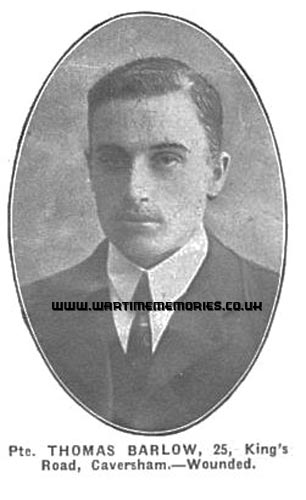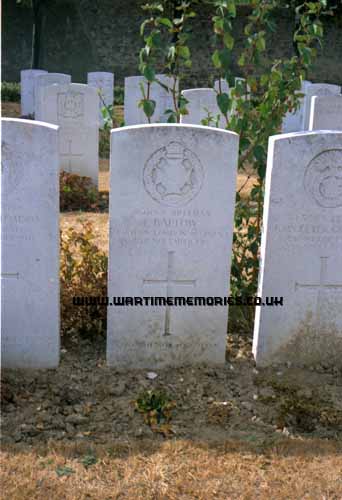Additions will be checked before being published on the website and where possible will be forwarded to the person who submitted the original entries. Your contact details will not be forwarded, but they can send a reply via this messaging system.
please scroll down to send a message
Pte. Thomas Barlow
British Army 1st Battalion Royal Berkshire Regiment
from:Caversham, Reading
(d.5th Nov 1918)
Thomas Barlow was born in February 1887 in the small downland village of West Ilsley in rural Berkshire. His father was a shepherd and in the 1901 Census he was employed as a teamster on a farm. By then the family had moved to Cholsey.
Thomas signed up at Brock Barracks in Reading, for 9 years service in 1904 at the age of 18. He saw service in Ireland and India. He was placed on the Reserve in 1911. He married Edith Ellen Maskell in 1912 at the Wesleyan Chapel in Caversham and he found employment with Great Western Railway as a Lineman. They had two girls, Amy (1912) and Winifred (1916) before Britain declared war against Germany and Thomas returned to serve with the British Expeditionary Force in France from 5th of August 1914. He was wounded in May 1915 and returned home to recuperate. Whilst at home he was interviewed by the Berkshire Chronicle Newspaper of his account of service with the Royal Berkshire Regiment and it was published on 20th of August 1915.
Thomas starts by saying: "We embarked at Southampton on the afternoon of August 11th, and arrived at midnight at Le Havre, where we anchored until daylight. We then proceeded up the river to Rouen, where we disembarked and marched through Rouen to a camp just above the racecourse. We had a fine reception as we went through, as I believe we were the first English regiment to pass through this town. We stayed at this camp for two days, and then took a train to a place nearer the Belgian frontier. We marched from there to Venerolles, where we had ten days of good hard field training. We thought at the time we were being hard done by, but we found out afterwards that it came in very useful to us. After the ten days at Venerolles we marched nearer to the frontier to Landrecies, where we billeted in some French barracks for the night, continuing the march to the frontier next day, which was Saturday. Early on Sunday morning we had our first bit of excitement, as we were told we had to march to a place not mentioned, and hold it at all costs." He then describes his involvement in action at various places and the exemplary behaviour of an Officer of the Regiment. The Headings for each of these places, etc, is too much to give in this article, but the headings for each bit of action are as follows, The Battle of Mons; The Retreat From Mons; The Action at Maroilles; The Coolness of Major Finch; Recovering a Gun; The German Retreat; An Unfortunate Mistake; The Incident of Metz Valley; Fighting Near Ypres; The News of the Emden; A Gallant Party; Winter Hardships; Helping the 2nd Battalion.
The Article finishes with: "Shells were coming over amongst us very heavily, but our artillery were doing some marvelous work compared with the enemy. On the third day we were given our orders to get ready to make an advance. Whilst getting prepared for this I was hit by a splinter of a shell, and left for England after ten months of one of the worst wars in history."
Thomas was home in England from 19th of May 1915 until 3rd of July 1918. We have no details of his life in Caversham with his wife and family, but we do know that they had one more child, a son, Thomas Richard who was born in May 1918. Without him I would not be writing this story as he was my father who saw service with Royal Air Force in WW2. Back to Thomas (Senior) he was posted to France and was serving with the London Rifle Brigade when he contracted what became known as the Spanish Flu and died in Boulogne on 5th of November 1918, aged 31, just six days before the end of the Great War. He was subsequently buried at the British Military Cemetery at Terlincthun, Wimille, near Boulogne. He was awarded the 1914 Star, The British War medal and the Allied Victory medal, affectionately known as Pip, Squeak & Wilfred. He served with the 1st Royal Berkshire Regiment, Gloucestershire Regiment and 33rd London Regiment.

